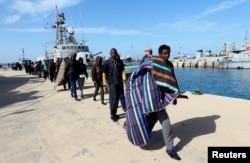Italy’s collaboration with Libya to stop migrants from crossing the Mediterranean is facing a legal challenge. A lawsuit filed in the European Court of Human Rights asserts that Italy’s work with the Libyan coast guard has forced thousands of people to return to Libya against their will, subjecting them to inhumane conditions.
Seventeen Nigerian migrants who survived a deadly sea crossing in November last year have filed the lawsuit. They say Italy is violating their human rights by supporting Libyan efforts to stop migrant boats from reaching Europe.
By blocking the boats, the plaintiffs argue, Italy and Libya force thousands of would-be migrants to face inhumane conditions, torture and beatings in Africa.
The co-founder of the Forensic Oceanography project, Chris Heller, prepared a report presented as part of the case. He said the Libyan government behaved carelessly to intercept migrants and return them to Libya. At least 20 drowned in the incident last November.
He said that Italy and the European Union essentially re-established the Libyan coast guard, which was operationally non-existent until the end of 2017, in order to pull migrants back to Libya with the consent and knowledge of the Italian authorities.
“Italy has, with the EU, exercised strategic and operational control over the Libyan coast guard which has operated as its proxy to intercept migrants," he said.
Heller said the Libyan coast guard intercepted more than 20,000 migrants in 2017.
Italy and the European Union, he said, implemented their policy with full knowledge of the violent and criminal behavior of the Libyan coast guard and of the fate of extreme forms of violence and exploitation that has awaited many of those returned to Libya.
“While this operation has temporarily succeeded in stemming crossings, this has been done by the outsourcing of human rights violations to Libyan actors and has made migrants bear a human cost that is much too high," said Heller.
The Italian government has not yet reacted to the lawsuit, which was filed last week.
While the legal challenge may represent the biggest hope for change for the many migrants, the lengthy process could take up to three years.









